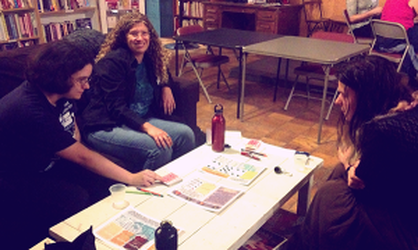 What do I mean by an inclusive gaming space? An inclusive gaming space is one where your players feel comfortable being there, engaging in the game, and having fun. This doesn’t mean the characters your players are playing always have to be happy. Hell, if we are playing mature higher level deep role-playing games we know that sometimes our characters misery helps to drive a good story. A good story should not harm or hurt your players though and creating an atmosphere of inclusion at your table means finding ways to embrace diversity and be sensitive to the needs of your players. In the end, it comes down to this: know your players and be respectful to them as human beings. If a joke or a storyline goes too far, stop it, apologize, and debrief as soon as possible. This line will be in different places for different players and we’ll discuss some ways to keep on top of this below. Set ground rules and follow them: Rules are essential to gaming, right? Every great rules lawyer can fight for hours over obscure rules in the books. Well, setting table rules is no different. These rules should be focused on player actions, words, and feelings, not character actions, words, or feelings. What are some examples of good ground rules? No sex jokes, no out of character comments on race or racism, talk about out of character conflicts as soon as they start, to help work through them, if something occurs in-character that you are uncomfortable with tell everyone (or just the GM) and the scene should end immediately. These rules should be discussed by the players and the storyteller before the game starts. They should be agreed on and added to if needed as well. A good storyteller checks-in with his players constantly to see what their characters are doing and how action is impacting them, a great and inclusive storyteller does the same with the players themselves. Be Respectful of Everyone’s Background and Identity: Even when you are running a game at a convention or another public forum, you should try and have some understanding of who your players are. Take the time to ask questions, even 2-3 every session about the lives of your players. You aren’t doing this to interrogate them, but to be welcoming and helpful. If you know a player has had a bad week at work, give them a chance to work through some frustrations. If you know a player has experienced something traumatic in their background, be sensitive to stories that might remind them of that trauma and make their experience unpleasant. Again, I’m not saying you need to avoid difficult subjects in your game if that is what works for you and your players. I’m saying know them, be sensitive to them and make sure that the game you are running is the game that they want to play. This can include those that might not be playing, but hanging out around the table as well. You want to make your table a location to encourage the suspension of disbelief and to invigorate the imagination, being disrespectful has the opposite effect to that goal. Make Your Characters and NPC’s Real: I don’t mean 3D print a model for all of your NPC’s… though if you are inclined in that direction I don’t see anything wrong with it. No, I’m saying make your characters real people; make them multi-dimensional with faults and goals and different identities. If you have an antagonist that is a woman, do not make her a stereotype. If you have an NPC that is trans, make them real, give them hopes and dreams and avoid the obvious jokes you think you might evoke at the table. The more you make your characters real, the more you respect the diversity at your table in every way. If you want to delve into issues of racism, sexism, and prejudice of all kinds in your game and your players are interested in doing so as well, do it, but do it with the goal of humanizing all creatures/people/monsters in the game. Making your gaming table inclusive should not be a chore; it should be something that comes naturally to us. If we can empathize and imagine being magical beings and science fiction heroes, we should be able to imagine how it might be to be treated poorly for our identity in real life. Taking the time to respect and know your players and run the game that they love to play will drive more and more people into this hobby. If you have other suggestions on how to make your gaming table inclusive, please feel free to share them in the comments. With 17 years of playing rpgs, Josh started with Mind's Eye Theater LARPs and loves the World of Darkness. Josh is the administrator of the Inclusive Gaming Network on Facebook, is running both a Mage game and a Dark Ages: Vampire game at the moment, and is an advocate for inclusive gaming spaces. He's also a father and a recent graduate from the International Peace and Conflict Resolution graduate program at American University in Washington, D.C. 17/11/2016 11:46:33 am
There are so many gaming gadgets available, but what do you really need? I went to my experts.
Reply
Leave a Reply. |
All blog materials created and developed by the staff here at High Level Games Archives
April 2023
Categories
All
|
Proudly powered by Weebly



 RSS Feed
RSS Feed